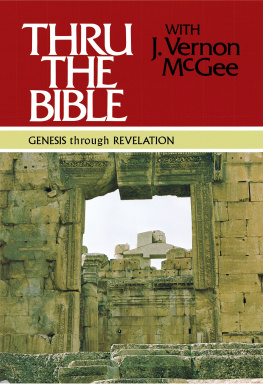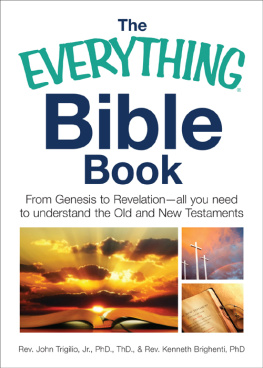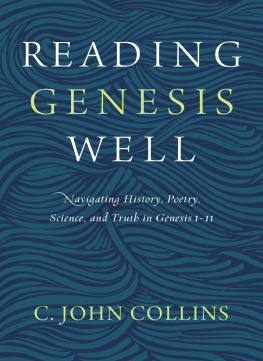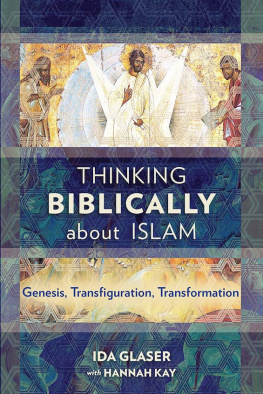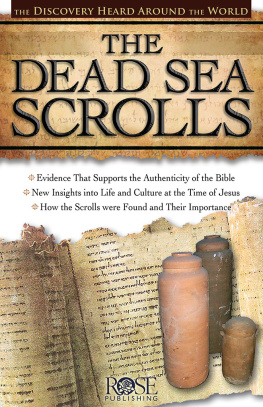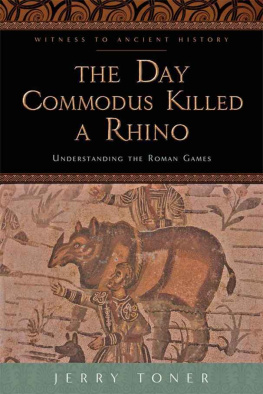B ad things happen in the Good Book. Not surprisingly, perhaps: its goodness has to a considerable extent been thrust upon it in modern retrospect; its actually the product of a distant and a very different time. The idea that we should turn its pages for spiritual comfort and moral edification is comparatively new and makes demands on the Bible that it struggles to fulfil. This is not to say that such sustenance isnt to be found in the Bibles pages of course it is. Just that it takes a reader who is predisposed to be receptive and at times a bit selective.
These limitations may be structural: once we accept the Bibles premise that the whole of humanity is descended from a single couple, then we have to acknowledge its easy acceptance of incest among our remoter forebears. (A certain capacity for denial is needed even for fundamentalists, few of whom can really find the time and energy to become seriously exercised about the evils of mixing wool and linen Leviticus 19, 19). Other shortcomings (if thats really what they are, as these are matters of perspective) simply show the vastness of the cultural and social changes that have taken place in the thousands of years since the earliest Israelites (a small, largely pastoralist people) walked the earth. The realities of life even the apparently timeless ones have been transformed by everything from democratic politics to the germ theory of disease; from air travel to anaesthesia and womens rights.
And he went unto his fathers house at Ophrah, and slew his brethren being threescore and ten persons, upon one stone (9, 5). The Book of Judges reports the crimes of Abimelech (depicted here by Gustav Dor) almost gleefully.
A Decent Decalogue
The Ten Commandments are all very well: murder, most of us would agree, is wrong, covetousness is a corrosive feeling and adultery undermines the happiness of whole families. But the Commandments emphasis on the need to avoid idolatry, understandable as this is in its biblical context, has seemed strange for centuries certainly for the whole of the Christian period. (Hence the rage to rationalize these decrees as injunctions against the worship of worldly things like sex or money.) And, if its wrong to kill, what of all that smiting? From the Book of Joshua onwards, the Bible is full of it. What of Samson (Judges 16, 28)? Should we see his death as justifying the suicide bombers of our own age?
THE THING WHICH HE DID
PERSPECTIVE IS ALL, and every generation recreates the Bible in its own image. However firm we think we are in our belief, were invariably selective in what we see. While modern readers have successfully turned a blind eye to scripturally-sanctioned incest, polygamy and genocide, theyve also tended to see sins that just arent there. Take the notorious case of Onan: that unfortunate son of Judah has been forever identified with the sin of masturbation.
That the Bible, while certainly condemning Onan, makes no such judgement against him is clear to anyone who reads his story (Genesis 38, 8):
And Judah said unto Onan, Go in unto thy brothers wife, and marry her, and raise up seed to thy brother. And Onan knew that the seed should not be his; and it came to pass, when he went in unto his brothers wife, that he spilled it on the ground, lest that he should give seed to his brother. And the thing which he did displeased the Lord.
What it was that displeased the Lord, it seems, had little or nothing to do with the sin of onanism. (Onans crime may even have been one of coitus interruptus, some scholars say.) It certainly doesnt seem to have been the act of masturbation per se that offended God but his deliberate and defiant withholding of his semen; his refusal to serve his sister-in-law as his father had directed.
As authoritative as it seems, as sonorously as its written, the Word of God is open to unnumerable interpretations.
Abimelechs slaughter of the 70 princes who apparently impede his path to the throne occasions no particular editorial comment in Judges 9. Davids affair with Bathsheba, and his murderous plot against her husband Uriah (2 Samuel 11), are condemned and divinely punished, although the king is held up as an example for all generations thereafter.
And what of the Bibles more implicit rulings those it doesnt assert outright yet appears to exemplify: its disapproval of Miriams defiance of her brother Moses (Numbers 12, 1), for example? Theres no doubt that Miriams waywardness offends the Lord (shes afflicted with leprosy in punishment), but is it as Gods appointed leader, or simply as a man, a brother a male that Moses should have been revered?
Open to Interpretation
As authoritative as it seems, as sonorously as its written, the Word of God is open to innumerable interpretations. This really shouldnt come as a great surprise, of course. Any text is, pretty much by definition, susceptible to a range of different readings. When that text is actually, like the Bible, a collection of several different texts, the possibilities are multiplied many times. To the 24 books of the




